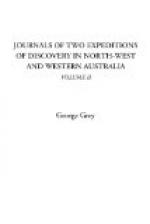These lines are repeated three times more, and then follows the chorus:
Chorus:
Ban-yee wur-rang-een,
Koong-arree, wur-rang-een,
Ban-yee wur-rang-een,
Koong-arree, war-rang-een.
etc. etc. etc.
Number 3.
Kat-ta ga-roo,
Ngia
Bur-na-ri-noo.
Yar-dig-o-roo,
Ngia
Bur-na-ri-noo.
etc. etc. etc.
Number 4.
Yerib-a-balo, may-il boyne ga-ree,
Yerib-a-balo, may-il boyne ga-ree.
etc. etc. etc.
Number 5.
Mar-ra boor-ba, boor-ba nung-a,
Mar-ra gul-ga, gul-ga nung-a.
SONGS AND EXTEMPORANEOUS CHANTS.
These songs give however no idea of the manner in which they chant forth their feelings. When irritated by any passionate emotions they then pour out with the greatest volubility torrents of reproach, all in a measured cadence and with at least the same number of syllables in each line, but even the rhyme is generally preserved; the two following translations of chants of this sort are rendered as literally into English as the great difference between the languages permits.
CHANTS OF JEALOUSY AND REPROACH.
The reader must imagine a little hut, formed of sticks fixed slanting into the ground with pieces of bark resting against them, so as to form a rude shelter from the wind; underneath this were seated round a fire five persons—an old man, and his four wives; one of these was considerably younger than the others, and being a new acquisition, all but herself were treated with cold neglect. One of her rivals had resolved not to submit patiently to this, and when she saw her husband’s cloak spread to form a couch for the newcomer she commenced chanting as follows, addressing old Weer-ang her husband:
Wherefore came you, Weerang,
In my beauty’s pride,
Stealing cautiously
Like the tawny boreang,*
On an unwilling bride.
’Twas thus you stole me
From one who loved me tenderly:
A better man he was than thee,
Who having forced me thus to wed,
Now so oft deserts my bed.
Yang, yang, yang, yoh—
Oh where is he who won
My youthful heart,
Who oft used to bless,
And call me loved one:
You Weerang tore apart,
From his fond caress,
Her, whom you now desert and shun;
Out upon thee faithless one:
Oh may the Boyl-yas** bite and tear,
Her, whom you take your bed to share.
Yang, yang, yang, yoh—
Wherefore does she slumber
Upon thy breast,
Once again to-night,
Whilst I must number
Hours of sad unrest,
And broken plight.
Is it for this that I rebuke
Young men, who dare at me to look?
Whilst she, replete with arts and wiles,
Dishonours you and still beguiles.
(Footnote. Boreang is the word for a male native dog.)
(**Footnote. Boyl-ya is the native name for a sorcerer.)




